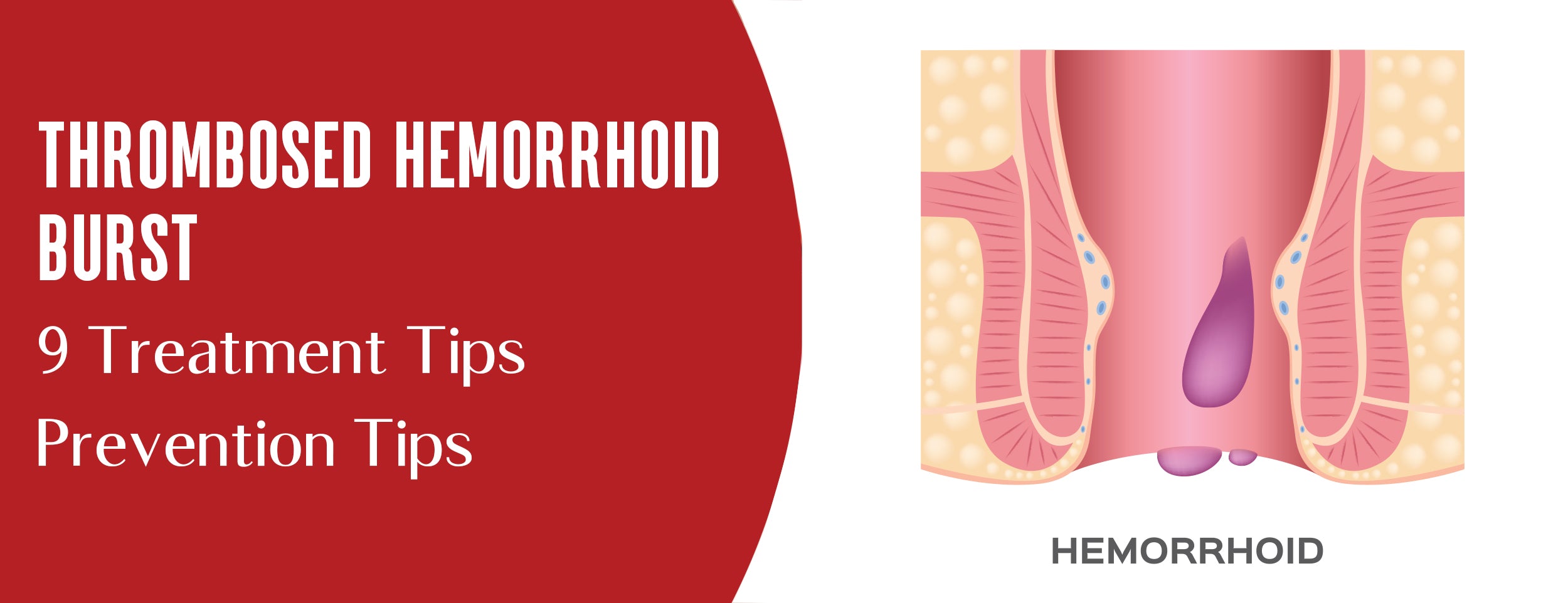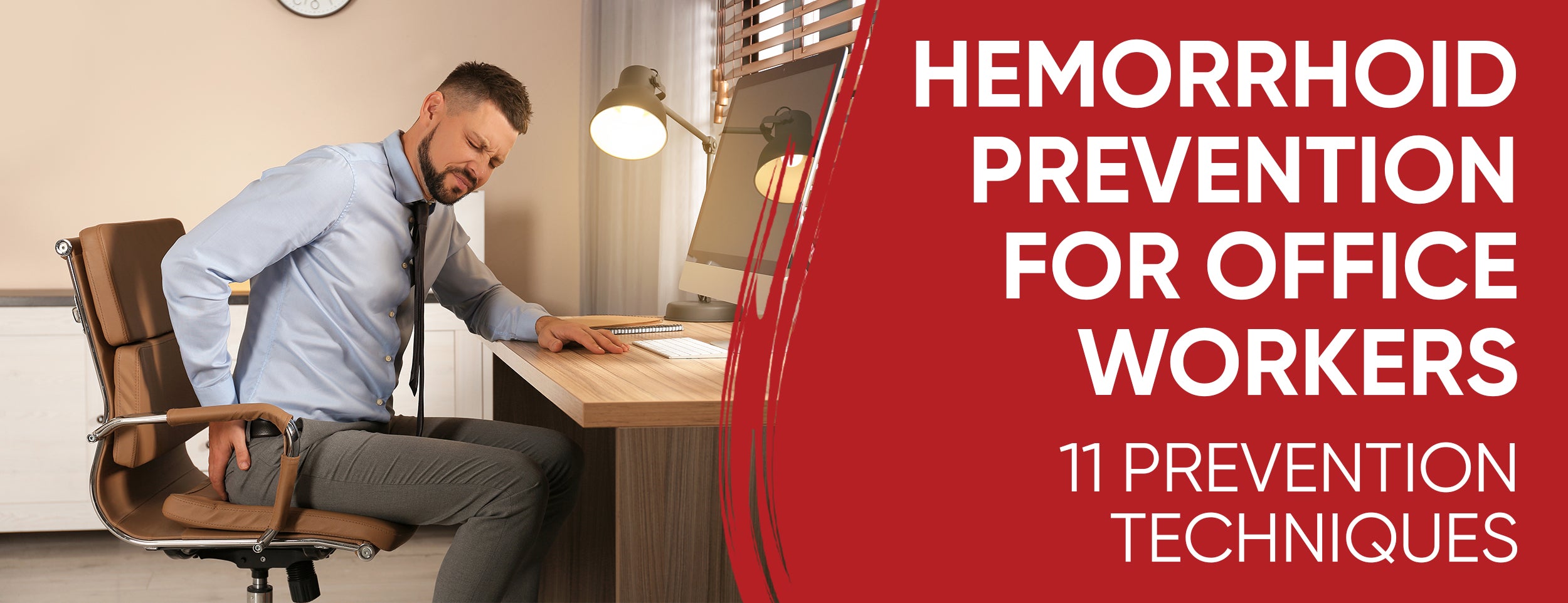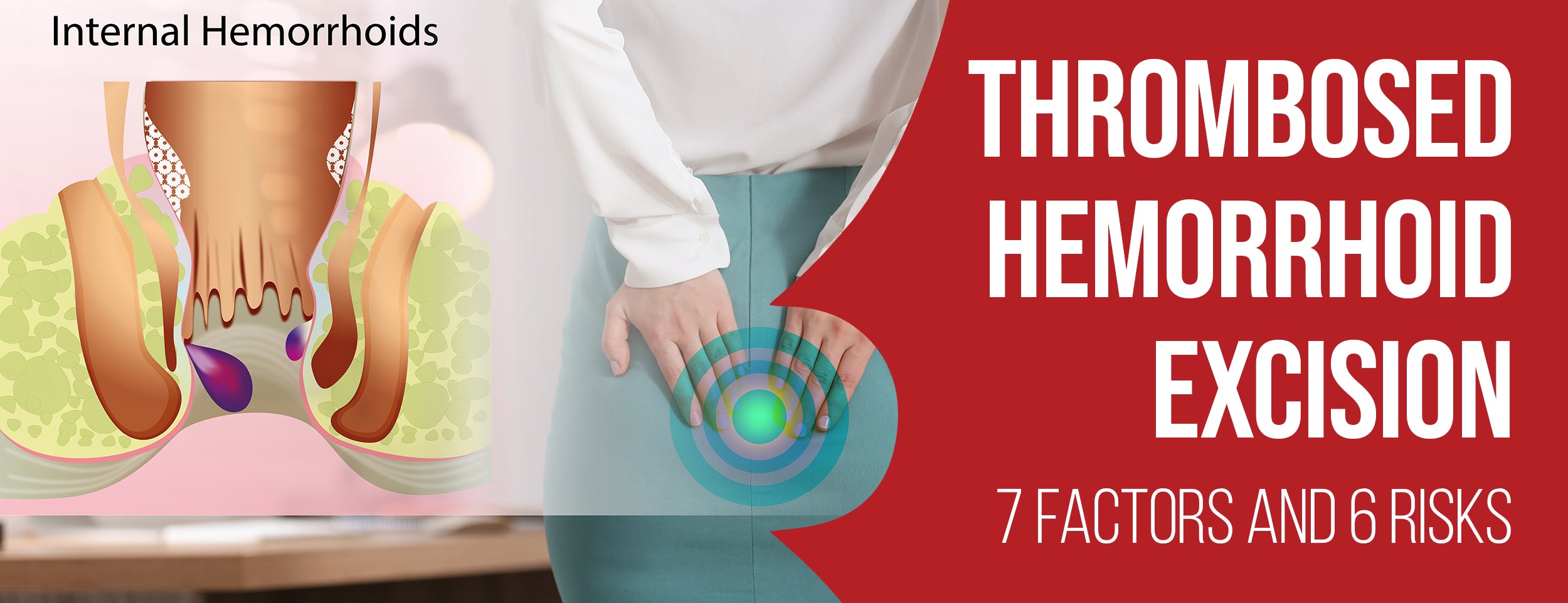Obesity is a well-known risk factor for developing hemorrhoids. The added weight puts significant pressure on the rectum and anal region, causing the blood vessels to become swollen and inflamed.
Obesity is associated with a sedentary lifestyle and poor dietary choices, exacerbating hemorrhoidal symptoms. A diet low in fiber can cause constipation, leading to straining during bowel movements, which is a significant cause of hemorrhoids.
This post will shine a light on how the weight of obesity presses down, causing ripples of pressure in the anal area, which brings about our not-so-friendly companion, the hemorrhoids. Along with the added weight, sedentary lifestyles and constipation play their roles in this uncomfortable drama, too.
The Takeways
- Obesity significantly increases the risk of developing hemorrhoids due to the pressure excess weight puts on the lower rectum and anus veins. Sedentary lifestyles, prolonged sitting, and rapid weight loss can also exacerbate hemorrhoidal symptoms.
- A healthy diet, regular physical activity, and weight maintenance can help prevent and manage both hemorrhoids and obesity. Gentler hygiene habits, like cleaning the anal area without harsh soaps or toilet paper, and treatments like sitz baths, can reduce the risk and alleviate symptoms of hemorrhoids.
- Weight loss medications and topical creams can provide relief for both conditions. Warm water baths can also provide immediate relief from hemorrhoid symptoms.
- For those dealing with obesity and hemorrhoids, surgical procedures may be necessary. However, delaying treatment could lead to complications like thrombosis, abscess, or fistula.
Relationship Between Obesity and Hemorrhoids

Studies have shown a clear association between obesity and the development of hemorrhoids. Hemorrhoids are caused by increased pressure on the anal area caused by being overweight or obese. Sedentary lifestyles can also cause hemorrhoids due to obesity and constipation.
There are several risk factors associated with obesity that can lead to hemorrhoids. Risk factors include high blood pressure, diabetes, and cholesterol. Anal blood vessels and arteries may be damaged by these conditions, making hemorrhoids more likely.
Cause of Hemorrhoids and Obesity
Welcome to our exploration of the intricate relationship between Hemorrhoids and Obesity. Here are some of the various factors that connect these two health issues. Let's explore the complex causes of hemorrhoids in individuals grappling with obesity.
Obesity as a Cause of Hemorrhoids
The development of hemorrhoids is associated with obesity. The excess weight puts stress on the anus and lower rectum veins, resulting in their swelling and inflammation.
Weight Loss and Hemorrhoids
Interestingly, while shedding excess pounds generally benefits overall health, rapid weight loss can sometimes exacerbate hemorrhoidal symptoms. This may be because of sudden changes in pressure within the abdominal and pelvic regions.

Being Overweight and Hemorrhoids
Obesity or overweight increases the risk of hemorrhoids. The added strain on the pelvic floor and surrounding blood vessels contributes to the formation of these painful and often debilitating conditions.
Prolonged Sitting and Hemorrhoids
Sedentary lifestyles, often associated with obesity, can also predispose individuals to hemorrhoids. Sitting for extended periods, especially on hard surfaces, may restrict blood flow to the abdomen and promote the development of hemorrhoidal veins.
The Connection between Piles and Weight Gain
Piles, another term for hemorrhoids, are not directly caused by weight gain but can be aggravated by it. Excess weight places undue pressure on the veins in the rectal area, making individuals more susceptible to developing or worsening hemorrhoids.
Too Much Time on the Toilet
Prolonged sitting on the toilet does indeed contribute to the development of hemorrhoids. The extended sitting can pressure veins in the rectal region, leading to swelling and inflammation, characteristic of hemorrhoids. To help prevent this, it's advisable to avoid prolonged sitting on the toilet and maintain good bathroom habits to reduce the risk of hemorrhoid formation.
Strategies for Preventing Hemorrhoids in Obese People

Obesity and hemorrhoids are often interrelated. Diet and exercise can prevent hemorrhoids. Exercise improves blood circulation, avoids prolonged sitting or standing, and taking frequent breaks helps.
Also, gentle cleaning of the anal area after bowel movements and avoiding harsh soaps or toilet paper reduces the risk of hemorrhoids. These simple strategies can benefit obese individuals to avoid hemorrhoids and improve their overall health.
Hemorrhoids and Obesity: Lifestyle Modifications

Obesity contributes to hemorrhoids by increasing pressure on rectal veins. Healthy lifestyles include regular exercise and a balanced diet to prevent this condition.
Exercise helps reduce weight, which in turn reduces the pressure on the rectal veins. Constipation can irritate existing hemorrhoids or cause new ones to develop. A balanced diet with high-fiber foods prevents constipation. Drinking lots of water and avoiding processed foods can also reduce straining.
Weight Maintenance Prevents Hemorrhoids:
A healthy weight helps prevent hemorrhoids due to the pressure put on the veins around the rectal area by excess body weight. In obese individuals, hemorrhoids are more likely to develop than healthy ones.
Weight loss combined with regular exercise reduces pressure on veins, reducing the likelihood of hemorrhoids. In addition, maintaining a healthy weight reduces the risk of diabetes, heart disease, and certain cancers associated with obesity.

Impact of Obesity on Hemorrhoid Treatment
Obesity makes treating hemorrhoids difficult. Due to limited access to the anal area, creams or ointments can be challenging. Surgery may be required for obese individuals with hemorrhoids. Weight loss is also difficult for obese individuals due to exercise and diet changes.
However, shedding some pounds can lessen pressure on the anal area and reduce hemorrhoids. Healthy living is tough for overweight people, which puts them at higher risk. A healthy lifestyle and weight can prevent hemorrhoids from complicating treatment.
Medications

Hemorrhoids and obesity can be managed with medication. Topical creams and ointments can alleviate hemorrhoid symptoms, while weight loss medications can help with obesity. If you take any medication, consult a physician and remember that they should be part of a larger lifestyle change.
Obese hemorrhoids: Early Detection & Treatment
To prevent hemorrhoids from progressing, obese individuals need early detection and treatment. A greater risk of hemorrhoids exists in obese individuals due to increased pressure on the veins.
Early detection allows surgical intervention before hemorrhoids become severe. Early treatment also reduces pain, itching, and bleeding, improving quality of life.
Physical Activity:

Physical activity is essential for managing hemorrhoids and obesity. Sedentary lifestyles can lead to hemorrhoids, while obesity results from inactivity and poor diet. Exercise alleviates hemorrhoid symptoms and promotes weight loss, improving overall health. Regular activity prevents chronic diseases, boosts energy, and enhances well-being, crucial for those with these conditions.
Warm Water Bath

To ease hemorrhoid discomfort, a warm water bath reduces inflammation and encourages healing. A boost in metabolism also aids in weight loss. The increased blood flow promotes tissue repair and relieves anal itching. Regular warm baths can help with joint pain and stiffness, benefiting overall health. Any treatment should be discussed with a healthcare provider.
Using Ice Packs to Reduce Swelling

Inflammation and swelling can be reduced with ice packs in various health conditions. They alleviate pain, limit the progression of related symptoms, and constrict blood vessels to reduce discomfort. They are effective for hemorrhoids by relieving swelling caused by increased pressure in the anal and rectal veins.
They help manage inflammation, joint pain, and swelling in obese individuals. Ice packs are a cost-effective and convenient treatment option for many health conditions.
Astringents:

Astringents can treat common health conditions such as hemorrhoids and obesity. They reduce inflammation and speed up healing by shrinking tissues. Witch hazel is a commonly used astringent for hemorrhoids, while green tea and grape seed extract can help with obesity. Astringents are versatile and can reduce inflammation, promote healing and aid in weight loss.
Protectants:
Protectants reduce tissue inflammation and can relieve symptoms of hemorrhoids and obesity. Applying protectants to the affected area can ease itching, swelling, and pain, and promote healing. Complementing protectants with lifestyle changes, medications, and other treatments can further improve outcomes. Protectants can help improve your quality of life by reducing inflammation.

Decongestants:
Studies suggest decongestants can reduce swelling in the rectal area and relieve hemorrhoids and inflammation caused by obesity. Decongestants can also boost metabolism, lower blood sugar levels, reduce appetite, and improve physical performance.
However, they don't cure hemorrhoids or obesity, and long-term use can increase heart rates and blood pressure. It's important to maintain a healthy lifestyle, including a nutritious diet and regular exercise. You should talk to your doctor before taking regular decongestants.
Steroids:
Steroids are commonly prescribed for medical conditions and can treat hemorrhoids. Corticosteroids have anti-inflammatory effects that reduce hemorrhoid swelling. Steroids for obesity are controversial and not recommended, except for hormonal disorders. Steroids increase muscle mass, reduce body fat, and improve fat metabolism.
However, their misuse for weight loss can cause liver and kidney damage, mood disorders, and cardiovascular complications. Consult a medical professional and follow the prescribed dosage and instructions when using steroids for any medical condition.
Exercise Regularly:

Regular exercise can help prevent hemorrhoids by reducing body weight, maintaining a healthy BMI, preventing constipation, and reducing the risk of obesity. Activities like brisk walking, jogging, and cycling are beneficial in reducing body weight, preventing constipation, and maintaining a healthy BMI. Incorporating regular exercise into one's routine can enhance overall health and help prevent these conditions.
Topical Anesthetics:

Topical anesthetics can relieve discomfort from swollen veins and excessive body fat. Apply a cream or gel to the affected area for immediate relief. Over-the-counter sprays or wipes with lidocaine, benzocaine, pramoxine, and dibucaine are popular options. However, prolonged use can cause skin irritation, allergic reactions, or toxicity. Don't apply to open wounds, broken skin, or infected areas. Consult a doctor if your symptoms don't go away.
Eating Healthy:
Healthy eating is crucial to preventing hemorrhoids and obesity. Eating fiber-rich foods like whole grains, vegetables, fruits, and legumes can prevent constipation and aid in regular bowel movements. Avoiding caffeine and alcohol and drinking water will keep you hydrated. A healthy diet can reduce inflammation and help you lose weight, lowering the risk of hemorrhoids. A nutritious diet leads to better health and well-being.
Drink Plenty Of Water And Other Fluids:

Obesity and hemorrhoids are often linked. Excess body fat can reduce blood flow to the rectum and anal blood vessels, leading to hemorrhoids. Drinking fluids relieves hemorrhoid symptoms and prevents constipation. Staying hydrated can also aid weight loss by curbing appetite and enhancing metabolism. For professional advice, consult a healthcare provider.
Surgical Options for Hemorrhoids in Obese Patients
- Hemorrhoids obesity can adversely affect a person's quality of life. A hemorrhoid is a swollen vein that causes discomfort, pain, and bleeding. Obesity is associated with excessive body fat, causing heart disease, diabetes, and stroke.
- Surgical options are often considered an effective treatment for hemorrhoids in obese patients. Depending on the severity of the hemorrhoids, doctors may suggest hemorrhoidectomy, stapled hemorrhoidopexy, or rubber band ligation.
- In hemorrhoids, hemorrhoidectomy involves removing hemorrhoid tissue through surgery. A local or general anesthetic can be used for patients with severe or extensive hemorrhoids.
- Prolapsed and hemorrhoids (PPH) can be treated with staple hemorrhoidopexy, a minimally invasive procedure using a circular stapler device. The recovery time is quicker after this procedure than after a hemorrhoidectomy.
- Another surgical option is rubber band ligation, which uses rubber bands to tie off hemorrhoids. Hemorrhoids under mild severity can benefit from this painless procedure.
- Lifestyle changes such as a healthy diet and regular exercise can also reduce the risk of hemorrhoids in obese patients. To manage hemorrhoids and obesity effectively, you should seek medical attention as soon as possible.
Treatment Options for Hemorrhoids and Obesity
Hemorrhoids and obesity are primarily treated with procedures and surgeries. Obesity refers to excess fat accumulation in the body, while hemorrhoids are swollen and inflamed veins.

Hemorrhoids Treatment
- For hemorrhoids, several surgical and nonsurgical procedures exist.
- Non-surgical treatments include increasing fiber intake, taking sitz baths, and using medicated wipes or creams. Treatments such as these manage symptoms but aren't permanent.
- Surgical procedures are often reserved for severe or recurrent hemorrhoids. Hemorrhoidectomy, the complete removal of hemorrhoids surgically, is a common surgical method.
- Minimally invasive surgical techniques, such as rubber band ligation (injecting a chemical solution to close hemorrhoids), are becoming more popular.
Obesity Treatment
- Surgery can reduce the stomach size or limit calorie absorption to treat obesity. Surgery for obesity usually involves gastric bypass, adjustable gastric banding, or sleeve gastrectomy.
- Gastric bypass involves reducing the stomach size and rerouting the small intestine to the newly created pouch. Fewer calories are absorbed, resulting in significant weight loss.
- The Sleeve Gastrectomy creates a tube by removing a large portion of the stomach.
Conclusion
Hemorrhoids can occur due to several factors, including obesity, which must not be ignored as a risk factor. It can be prevented by maintaining a healthy weight, eating fiber-rich foods, and staying active.
If you experience any symptoms, seek medical attention immediately. Detection and treatment early can speed recovery. Preventing most health concerns involves proactive measures to maintain optimal health.















![Healing thrombosed hemorrhoid naturally & medically [with home care tips]](http://drnumb.ca/cdn/shop/articles/Healing_Thrombosed_Hemorrhoid_11_Natural_Remedies_Full_Covered.jpg?v=1715323330)




